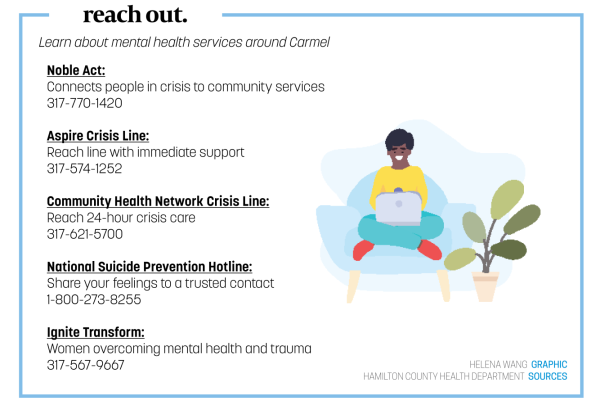According to the Grove Estate, 345,000 adults in Indiana require mental health care but are not able to receive it. To improve community mental well-being, the Hamilton County health department collaborated with CredibleMind to create a free database of mental health resources.
The official press release said CredibleMind is a digital platform which focuses on the prevention of mental health issues. The platform provides a space for users to assess and receive advice regarding their mental health.
According to Jason LeMaster, Hamilton County health department administrator, the initiative was made possible by a funding increase.
“Funding that became available through the state legislature for core public health services allocated to Hamilton County has allowed the health department and social behavior staff to develop the CredibleMind website contract service,” LeMaster said. “Prior to the utilization of CredibleMind, there wasn’t a web-based platform that could provide comprehensive self-assessment and connections to self-help tools for individuals seeking help for behavior, health and substance abuse.”
Social worker Sara Knoop said online mental resources improve accessibility to professional help which may not be available to everyone.
”The number one thing is just ease,” Knoop said. “You can access (an online resource) wherever you are and whenever you want. I am a resource connector. So if somebody is in need of resources within this building or outside of this building, then I’m looking to direct them to resources such as this one.”

However, for junior Avner Cohen, additional resources are not the best mental health solution to improving mental health, including among students.
Cohen said, “More resources are good but the ones that are in place right now are still being underutilized. More resources doesn’t fix the root of the issue being people not using the current ones.”
Instead, Cohen said he believes improving transparency should be emphasized for future mental health initiatives at this school. More specifically, Cohen said student privacy should be further prioritized in order to build trust between school representatives and students.
According to Knoop, there are efforts being made to connect with students outside of a counseling office.
“Every year we do a mental wellness week,” Knoop said. ¨We do work individually with students most often, but we do try to bring in things that can be for the whole school as well. So, yes, we have a mental wellness week actually coming up the week of March 17 where we just focus on different components that lead to positive mental illness.
Junior London Anderson said this school should consider incorporating mental health-oriented remote learning days alongside current mental health initiatives.
“I think something that could be put in place is an at-home day, where classes can be online and have shorter pieces of work, which can give students more time to work on their homework and catch up with anything that they may be falling behind on or feeling overwhelmed with,” Anderson said. “I think (students) are so overwhelmed with school and their expectations that they often find themselves not having enough time to fulfill their goals and expectations that they would like to.”
Anderson said the best resource this school provided for her mental health is the teachers and the relationships she was able to build with them.
“The best thing that this school has done for my mental health right now is give me teachers that I feel I can talk to,” Anderson said. “I feel like every year that passes I have one or two teachers that I’ve grown a strong relationship with that I can really connect with and share my experiences with, and continue to see them as years go on. I really look up to those teachers and their impact they’ve made on me throughout my stressful high school years.”

































![AI in films like "The Brutalist" is convenient, but shouldn’t take priority [opinion]](https://hilite.org/wp-content/uploads/2025/02/catherine-cover-1200x471.jpg)









































![Review: “The Immortal Soul Salvage Yard:” A criminally underrated poetry collection [MUSE]](https://hilite.org/wp-content/uploads/2025/03/71cju6TvqmL._AC_UF10001000_QL80_.jpg)
![Review: "Dog Man" is Unapologetically Chaotic [MUSE]](https://hilite.org/wp-content/uploads/2025/03/dogman-1200x700.jpg)
![Review: "Ne Zha 2": The WeChat family reunion I didn’t know I needed [MUSE]](https://hilite.org/wp-content/uploads/2025/03/unnamed-4.png)
![Review in Print: Maripaz Villar brings a delightfully unique style to the world of WEBTOON [MUSE]](https://hilite.org/wp-content/uploads/2023/12/maripazcover-1200x960.jpg)
![Review: “The Sword of Kaigen” is a masterpiece [MUSE]](https://hilite.org/wp-content/uploads/2023/11/Screenshot-2023-11-26-201051.png)
![Review: Gateron Oil Kings, great linear switches, okay price [MUSE]](https://hilite.org/wp-content/uploads/2023/11/Screenshot-2023-11-26-200553.png)
![Review: “A Haunting in Venice” is a significant improvement from other Agatha Christie adaptations [MUSE]](https://hilite.org/wp-content/uploads/2023/11/e7ee2938a6d422669771bce6d8088521.jpg)
![Review: A Thanksgiving story from elementary school, still just as interesting [MUSE]](https://hilite.org/wp-content/uploads/2023/11/Screenshot-2023-11-26-195514-987x1200.png)
![Review: "When I Fly Towards You", cute, uplifting youth drama [MUSE]](https://hilite.org/wp-content/uploads/2023/09/When-I-Fly-Towards-You-Chinese-drama.png)
![Postcards from Muse: Hawaii Travel Diary [MUSE]](https://hilite.org/wp-content/uploads/2023/09/My-project-1-1200x1200.jpg)
![Review: "Ladybug & Cat Noir: The Movie," departure from original show [MUSE]](https://hilite.org/wp-content/uploads/2023/09/Ladybug__Cat_Noir_-_The_Movie_poster.jpg)
![Review in Print: "Hidden Love" is the cute, uplifting drama everyone needs [MUSE]](https://hilite.org/wp-content/uploads/2023/09/hiddenlovecover-e1693597208225-1030x1200.png)
![Review in Print: "Heartstopper" is the heartwarming queer romance we all need [MUSE]](https://hilite.org/wp-content/uploads/2023/08/museheartstoppercover-1200x654.png)



